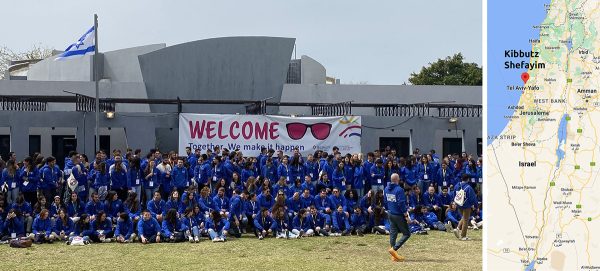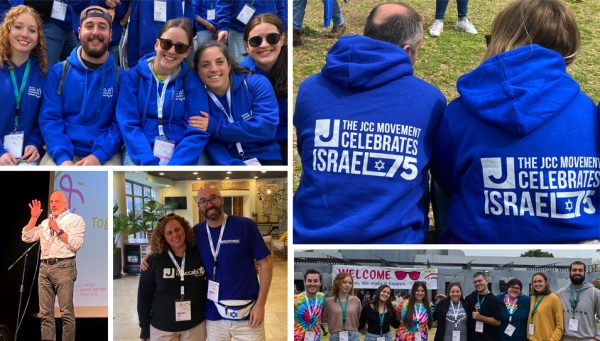By Doron Krakow
A Break in the Clouds
I’m back in Israel this week. In addition to spending time with colleagues, friends, and family, my hectic schedule included meetings with government representatives, a former Minister for Diaspora Affairs, several Jewish leaders from abroad, and prominent players in the fields of Jewish community building and Jewish education. Common to just about every conversation—Israel’s political scene, judicial reform, and seemingly cavalier and careless comments and statements by members of the government and prominent figures in the opposition.
Yesterday was a day of protests and demonstrations. Countless Israelis stayed home from work and school to participate. They gathered near the homes of government leaders, covered billboards with slogans and images of some of Israel’s prominent iconic figures, and assembled on major thoroughfares—stopping traffic and disrupting the day’s routine. The few who ventured out for other reasons went to great pains to avoid getting entangled—honking their horns in approval or disapproval of the protesters who crowded junctions, parks, overpasses, and the entrances and exits of many cities and towns.
Each day’s news brings additional rumors: Coalition members preparing to break with colleagues to oppose the unfolding legislative onslaught. Plans for boycotts and further disruptions. Expected statements and actions from the attorney general or the Supreme Court. Meanwhile, the legislative process rolls on, as growing numbers of Israelis of all stripes increasingly make their voices heard. There is a palpable air of anticipation and foreboding, a sense that something important is happening—and that it may alter the character of Israeli society.
All this, and yet none of it is the reason I’m here.
For the past several days, I have been at Kibbutz Shefayim, along the Mediterranean coastline, as part of a seminar for more than 400 young Israelis who are preparing to spend this summer working in JCC overnight and day camps across North America. Having completed their military service, they chose to embark on a journey of discovery both personal and about all of us. An exhaustive interview and screening process, under the auspices of the Jewish Agency for Israel (JAFI), preceded intensive training for an experience that likely will impact their lives in ways they cannot begin to imagine, knowing their success will also affect the lives of countless thousands of campers, staff, parents, and communities.
 As the gathering began, the politics of the day, of course, warranted mention but only because these remarkable young people had forgone participation in the protests, in deference to their commitment to the seminar. Once mention was made, the focus shifted to the work that lies ahead. To the mission before them. Their attention turned to our shared commitment to Jewish peoplehood. To building and strengthening ties between Israelis
As the gathering began, the politics of the day, of course, warranted mention but only because these remarkable young people had forgone participation in the protests, in deference to their commitment to the seminar. Once mention was made, the focus shifted to the work that lies ahead. To the mission before them. Their attention turned to our shared commitment to Jewish peoplehood. To building and strengthening ties between Israelis
and Jews in North America. To preparing for the realities and possibilities they will encounter when they arrive at camp.
We talked about demographics and the recent Pew study. We talked Judaism as religion and the dynamics around denominational affiliation. We talked about the changing nature of participation in Jewish life, the growing numbers of North American Jews who have been to Israel, even as concerns deepen about a lessening of the emotional bonds and connection. We talked about antisemitism.
Also present were more than 40 representatives of JCC camps who had traveled halfway around the world to contribute their insights, experiences, and expertise to this remarkable gathering. They know that the performance and impact these young Israelis will have on JCC camps will be integral to the summer’s successes. And, like a pebble in a pond, will ripple on in the lives they touch and as a result of those who touch theirs.

It was a rare privilege to spend extended time in their company, and I can only hope my insights and contributions prove useful to them. But I am certain of one thing: The experience left me inspired—inspired by their passion and energy, curiosity and concern, by their amazing questions, and the conversations that ensued in smaller sessions and in those precious moments between sessions, when unfinished thoughts and exchanges continued.
“Can I share my opinions about what’s happening in Israel with Canadian and American campers and staff?”
“Help me understand the difference between critique of Israel and anti-Zionism.”
“When does one or the other—or both—become antisemitism.”
“I’m an atheist. Does that make me a hypocrite as a Jew?”
“Beyond religion, what are the elements that bind us together as a people?”
I still smile when I think about some of these exchanges. I caught myself a few times referencing seemingly recent events like the 1990 Jewish Population Study, the advent of Birthright, the disengagement from Gaza, and the Second Lebanon War—all of which happened before these young people were even born. Theirs is a frame of reference on the world informed by experiences in high school and the army in just the past 10 years; all but a handful literally are children of the 21st century.
Amidst all the questions and discussion—formal and informal—none turned to the politics of the day. It was Jewish peoplehood at issue: Who we are and the journey we took to get here. A seeming recognition that whatever this moment brings, the summer will be a chance to contribute to something far more lasting—to the links we share with one another but also with those who came before us and those who will follow. Not only last summer and next but across centuries and millennia.
Our people have come to countless crossroads, and we have endured and thrived—and so it will be with this one. Today’s political storm in Israel will pass, and whatever the upshot, our timeless commitment to one another, to Jews everywhere, to peoplehood, to Zionism, and to Jewish self-determination will remain.
Any doubts I may have had about our future, given the heavy and emotion-laden political overtones I experienced before I arrived at Kibbutz Shefayim, lifted like a cloud-covered sky broken by a ray of sunlight in the luminous company of a new generation of shlichim.
Am Yisrael Chai. | עם ישראל חי
Shabbat shalom.

Doron Krakow
President and CEO
JCC Association of North America

The Palestine Post’s March 21, 1948, headline shouted: U.S. ABANDONS JEWISH STATE: SUGGESTS TEMPORARY TRUSTEE. The article begins:
Reversal of America’s attitude towards the establishment in Palestine of a Jewish State and an Arab State was announced to the Security Council yesterday, on the termination of the Big Four talks, by Senator Warren Austin, who suggested a temporary Trusteeship for Palestine pending a final settlement. He also recommended a special session of the U.N. General Assembly to review the whole problem, with the Palestine Commission meanwhile instructed to suspend its activities connected with partition.”
China and France indicated their support, with objections raised by the Soviet Union’s representative. Great Britain affirmed its intention to terminate its Palestine mandate by May 15. Meanwhile, in Palestine, a Mapai (Labor) party meeting attended by David Ben-Gurion and Golda Meyerson (later “Meir”) called for the immediate establishment of a Jewish government.
These events underscored the precariousness of the commitment to the partition plan and the establishment of a Jewish state in Palestine only weeks before its scheduled implementation.
And that’s the way it was…
Reader Interactions